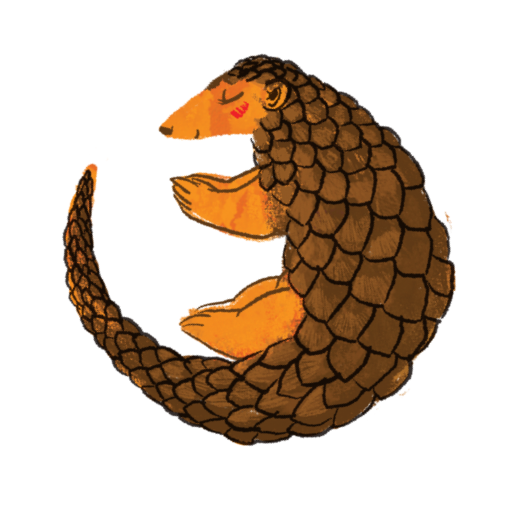


t is Hari Raya Haji, a holy day for Muslims. Which is why at the home of a smuggler, we are treated to a generous spread of food and sweets. There is rendang chicken, lemang, an assortment of snacks, and even a dish of pasta.
We dig in, because at that point, we didn’t know we were eating at the home of a smuggler. The matriarch of the household warmly urges us to eat more, but remains watchful.
“It didn’t happen in this house,” she says. “It was the house behind ours, on the same property, but it is owned by a relative who lives in Thailand and rarely visits.”
She is replying to our question about a 2017 seizure of 127 pangolins that our investigations reveal took place at her home address. Two Malaysian men were arrested, charged separately, and pled guilty, earning them a combined fine of RM145,000 (around US$ 35,000). They paid the fine and walked free. It is just one case out of a dozen other seizures since 2012 in this otherwise sleepy border town of Changlun, Kedah, just south of Thailand.
After some small talk, we ask to look at the house in question. She agrees.
It is less a house, and more like a derelict hall. Doors and windows are shut, trash and old furniture have accumulated along its corridors. ‘Enter in Peace’, says an inscription in Jawi script on the wall. A shallow pit, of unknown purpose, lies in the backyard. Everything is quiet and still under the afternoon sun.
But just as we turn to leave, a car pulls into the driveway, and from it emerges a scrawny figure dressed in hip-hop culture -- snapback, chains, low-riding jeans, and a t-shirt with a Gucci logo across the chest. We barely have time to recover.
“Are you here to see the property?” he is quick to ask.
“No.” A beat as we assess the situation. “We want to transport goods.”
“Oh,” he exclaims, as if it is a familiar situation.
“Tenggiling,” we say, using the Malay word for ‘pangolin’.
“Oh, tenggiling,” he exclaims, again unsurprised.
We start talking business, and the conversation reveals a smuggling route that is startlingly simple. A towkay, colloquial term for ‘boss’, passes him the goods, and he arranges to bring it across the border. After the border, the towkay recovers the cargo. The smuggler doesn’t have a share in the business, he is paid piecemeal by the towkay. Half up front, another half upon crossing the border.
“Guaranteed (safe delivery). We don’t want to get caught either, this is not a small crime.”- Pangolin smuggler
He refuses to divulge his price, saying he has to discuss it with his father, who seems to be the mastermind. He “watches the line,'' says the younger smuggler.
We later learn that the woman we spoke to earlier, the one whose food we ate with glee, is his mother.
Can you guarantee our goods cross safely? we ask. “Guaranteed,” he replies. “We don’t want to get caught either, this is not a small crime.”
Doesn’t Perhilitan (the Department of Wildlife and National Parks Peninsular Malaysia) disrupt you?
“There was once when someone reported to them. But after that, no more. We just changed location, avoided that old place.”Then he drops a bombshell: “That case (that was seized) was goods placed by IPK.” IPK refers to the Kedah state police headquarters, in Alor Setar. This young upstart smuggler then starts name-dropping police officers from that particular police station, officers who not only facilitate the smuggling, but according to him actually smuggle goods across themselves.
One of them is his brother-in-law.
“He is brave, this guy. During festive seasons like today, he smuggles fireworks using the police truck, the truck is full of fireworks.”He can cross that easily? “His ‘line’ goes from the Anti-Smuggling Unit, all the way to the top, everyone has been ‘kowtim’ (taken care of).
If you don’t ‘kowtim’ them, it won’t work, right? Maybe once or twice it works, but you must give them something.”“Everyone needs to eat a little, together. If we just eat everything ourselves, we won’t last long.”

It is Hari Raya Haji, a holy day for Muslims. Which is why at the home of a smuggler, we are treated to a generous spread of food and sweets. There is rendang chicken, lemang, an assortment of snacks, and even a dish of pasta.
We dig in, because at that point, we didn’t know we were eating at the home of a smuggler. The matriarch of the household warmly urges us to eat more, but remains watchful.
“It didn’t happen in this house,” she says. “It was the house behind ours, on the same property, but it is owned by a relative who lives in Thailand and rarely visits.”
She is replying to our question about a 2017 seizure of 127 pangolins that our investigations reveal took place at her home address. Two Malaysian men were arrested, charged separately, and pled guilty, earning them a combined fine of RM145,000 (around US$ 35,000). They paid the fine and walked free. It is just one case out of a dozen other seizures since 2012 in this otherwise sleepy border town of Changlun, Kedah, just south of Thailand.

After some small talk, we ask to look at the house in question. She agrees.
It is less a house, and more like a derelict hall. Doors and windows are shut, trash and old furniture have accumulated along its corridors. ‘Enter in Peace’, says an inscription in Jawi script on the wall. A shallow pit, of unknown purpose, lies in the backyard. Everything is quiet and still under the afternoon sun.
But just as we turn to leave, a car pulls into the driveway, and from it emerges a scrawny figure dressed in hip-hop culture -- snapback, chains, low-riding jeans, and a t-shirt with a Gucci logo across the chest. We barely have time to recover.
“Are you here to see the property?” he is quick to ask.
“No.” A beat as we assess the situation. “We want to transport goods.”
“Oh,” he exclaims, as if it is a familiar situation.
“Tenggiling,” we say, using the Malay word for ‘pangolin’.
“Oh, tenggiling,” he exclaims, again unsurprised.
We start talking business, and the conversation reveals a smuggling route that is startlingly simple. A towkay, colloquial term for ‘boss’, passes him the goods, and he arranges to bring it across the border. After the border, the towkay recovers the cargo. The smuggler doesn’t have a share in the business, he is paid piecemeal by the towkay. Half up front, another half upon crossing the border.
He refuses to divulge his price, saying he has to discuss it with his father, who seems to be the mastermind. He “watches the line,'' says the younger smuggler.
We later learn that the woman we spoke to earlier, the one whose food we ate with glee, is his mother.
Can you guarantee our goods cross safely? we ask. “Guaranteed,” he replies. “We don’t want to get caught either, this is not a small crime.”
Doesn’t Perhilitan (the Department of Wildlife and National Parks Peninsular Malaysia) disrupt you?
“There was once when someone reported to them. But after that, no more. We just changed location, avoided that old place.”Then he drops a bombshell: “That case (that was seized) was goods placed by IPK.” IPK refers to the Kedah state police headquarters, in Alor Setar. This young upstart smuggler then starts name-dropping police officers from that particular police station, officers who not only facilitate the smuggling, but according to him actually smuggle goods across themselves.
One of them is his brother-in-law.
“He is brave, this guy. During festive seasons like today, he smuggles fireworks using the police truck, the truck is full of fireworks.”He can cross that easily? “His ‘line’ goes from the Anti-Smuggling Unit, all the way to the top, everyone has been ‘kowtim’ (taken care of).
If you don’t ‘kowtim’ them, it won’t work, right? Maybe once or twice it works, but you must give them something.”“Everyone needs to eat a little, together. If we just eat everything ourselves, we won’t last long.”